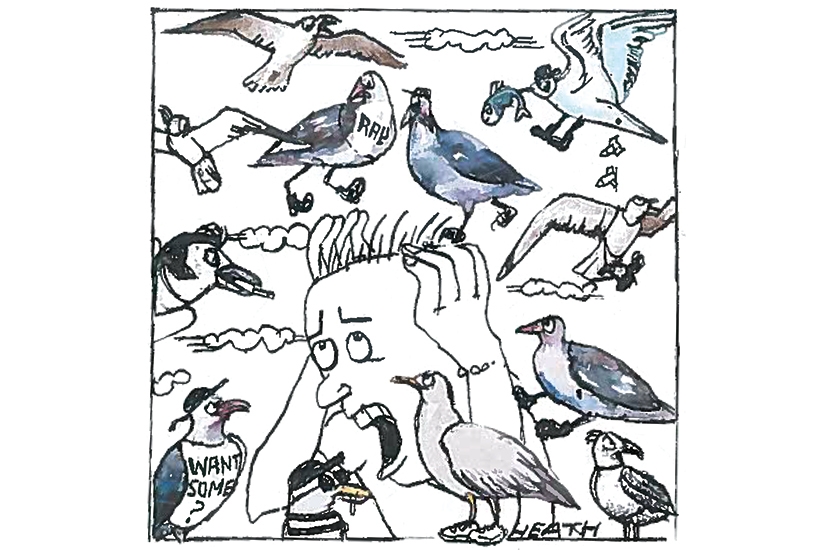Thousands of city dwellers have to live with the noise and mess of urban gull breeding colonies. Often dubbed ‘flying rats’ because they gorge on garbage, gulls are protected by Natural England — a public body sponsored by the government — on the grounds that they are supposedly endangered. Anyone who has to put up with their dawn-shattering racket and profuse defecation can only wonder at the truth of this; and the fact is that it’s based on seriously flawed science.
The wildly held belief (which also appears on the Natural England website) that the UK’s herring gull population has declined by 60 per cent is untrue. Yet their protected status has been enshrined in law to stop councils from dealing with a gull problem that in many of our cities causes distress to residents and damages urban environments. Far from decreasing, urban gull populations are rapidly increasing to the frustration of their human neighbours.
Despite this, councils across the land have dutifully fallen into line with Natural England’s demands, abandoning many of their urban gull control measures, including egg oiling and nest removals. So where did the idea of a 60 per cent decline come from?
Earlier this year, the Joint Nature Conservation Committee — the public body that advises on UK conservations — published an updated text from Seabird Populations of Britain and Ireland by Brian Madden and Stephen F. Newton. Originally published in 2004, this was an appraisal of Seabird 2000, a major census of all British and Irish seabirds. The study reveals that the myth of the 60 per cent decline is based on three censuses: Operation Seafarer (1969-70), which recorded 285,929 herring gulls; the Seabird Colony Register (1985-88), which recorded 149,197 — a fall of 48 per cent; and Seabird 2000 (1998-2002) which recorded 130,230 — a further fall of 13 per cent. If you add these numbers together, you get the much-quoted 60 per cent fall in numbers.
Importantly, though, the report states that ‘Inland colonies were not counted during the first two national censuses, so, to enable direct comparison, the percentage change refers to coastal colonies only.’ In other words, the 60 per cent decline is based only on coastal populations and takes little account of gulls moving inland to make the most of prolific feeding opportunities, such as landfill sites and urban streets.
Indeed, even the Seabird 2000 census barely touched the number of inland breeding colonies, claiming a population of only 1,960. A more recent study by leading urban gull expert Peter Rock claims that inland breeding colonies have since rocketed. ‘I can categorically say we’ve doubled the number of colonies since Seabird 2000 and there are still many to be added to that — it’s by no means complete,’ he said in 2015, calculating the number of urban seagulls had quadrupled in 15 years.
This year, a case study by Rock focusing on Worcester showed that its gull population had risen to 1,072 pairs, an increase of 440 pairs since he last counted them in 2006. In Dumfries the number of nesting pairs increased from 618 in 2010 to 660 in 2018. In Cardiff there has been a 15 per cent increase since 2004. Even more startlingly, in Gloucester just three pairs of lesser black-backed gulls were recorded in the dock area in 1967 —yet by 2004, 2,000 pairs of lesser black-backed and herring gulls had taken over the city. That, remember, is roughly the same period that is supposed to have registered a 60 per cent decline in herring gulls.
Further commentary by Madden and Newton on the Seabird 2000 census confirms that it was certainly not complete when it came to many urban centres, missing out Durham, Dumfries, Jarrow, Sunderland and South Shields as well as Dover, Folkestone and Cheriton. Elsewhere, simple flush counts of individual birds at urban colonies were made. ‘This is the least accurate method for censusing breeding gulls,’ say the authors. When discussing a downwards graph, they make the caveat that ‘this trend excludes urban nesting gulls from the sample and, therefore, may not be representative of trends in the entire UK population.’
Emphasising that any figures can only be used to draw conclusions about coastal populations, they then put forward the 60 per cent figure — while also adding that, ‘the decrease in the coastal natural nesting herring gull population may be indicative of decline in the entire UK breeding population, although this will not be known until a new census, which includes natural and urban nesting gulls, has been undertaken.’ The authors go on to speculate that the decline in coastal gull populations in the 30 years between 1970 and 2000 may have been due to gulls either catching botulism from feasting on refuse tips or from the fact that the sites were being better managed, reducing the available food. A reduction in the availability of discards from fisheries is also suggested, which explains their migration to becoming urban scavengers instead.
Despite the study’s own authors having pointed out severe misgivings about the real meaning of this flawed census data, wildlife activists have isolated the figures of 60 per cent for herring gulls and 48 per cent for lesser black-backed gulls. They have then used them to radically shift the law so that councils and residents can now do very little about the soaring populations in their communities, because these birds are ‘endangered’. Clearly they are not.
Removing the endangered status from urban gulls cannot come too soon for city residents woken up at 5 a.m. every morning by breeding gulls or harassed on hot summer evenings by aggressive, swooping seabirds depositing disease-laden faeces.






Comments